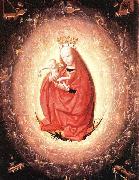Porslinet engros- Olja måleriet Engros- Måleriet Porslinet |
|||||||||||

|
|||||||||||
|
|
|
||||||||||||||
|
Geertgen Tot Sint Jans
Netherlandish Northern Renaissance Painter, ca.1460-1490 |
||||||||||||||
|
|
||||||||||||||
|
||||||||||||||
|
|
||||||||||||||
| Geertgen Tot Sint Jans
Netherlandish Northern Renaissance Painter, ca.1460-1490 26,8 x 20,5 cm Museum Boijmans Van Beuningen, Rotterdam This small painting of the Madonna depicts a fragile female figure holding her newborn together with a vanquished dragon. The artist indicates her floating, vision-like quality with the use of fantastic lighting and an army of angels in concentric circles. By arranging the choir of angels in a manner reminiscent of spheres, it is also expressed that the infant Jesus in the centre of the picture is the ruler of the Universe. With a sweeping gesture and a look of concentration, the infant is shaking two bells, as if to be in concert with the angel doing the same thing on the left side of the picture. They are definitely looking at each other, and since they are the only two doing this, the action has special significance: it shows the "conductor" Jesus in the role of the universe's prime mover. Thus the painting clearly expresses a concept formulated by St Thomas Aquinas, according to which Jesus created the harmony of the spheres. In Geertgen's painting the three attributes of Mary (glory, sadness and joy) are represented by angels encircling the Madonna in three rings. The inner circle contains six-winged cherubs and seraphs. The angels of the second circle hold above the head of Mary the early Christian symbols of glorification, scrolls with the word "Sanctus" appearing on them three times. The rest bear the objects associated with the Passion: the cross, the crown of thorns, a spear, nails, a hammer, and a column. The outside circle presents a multitude of musical angels, symbolizing heavenly happiness. Here we can see nearly all of the instruments of the period: lutes, violas, double recorders, trumpets, drums, bells, horns, bagpipes, hurdy-gurdies, etc. The larger keyboard instruments are located in the corners; on the organ we can see the hand-operated bellows. Obviously, the painter did not intend to reproduce the image of a real orchestra, that is why he included instruments which were never used together |
||||||||||||||
|
Related Paintings to Geertgen Tot Sint Jans :. |
||||||||||||||
|
|
||||||||||||||
|
|
||||||||||||||
|
KOMMA I KONTAKT MED Oss |







